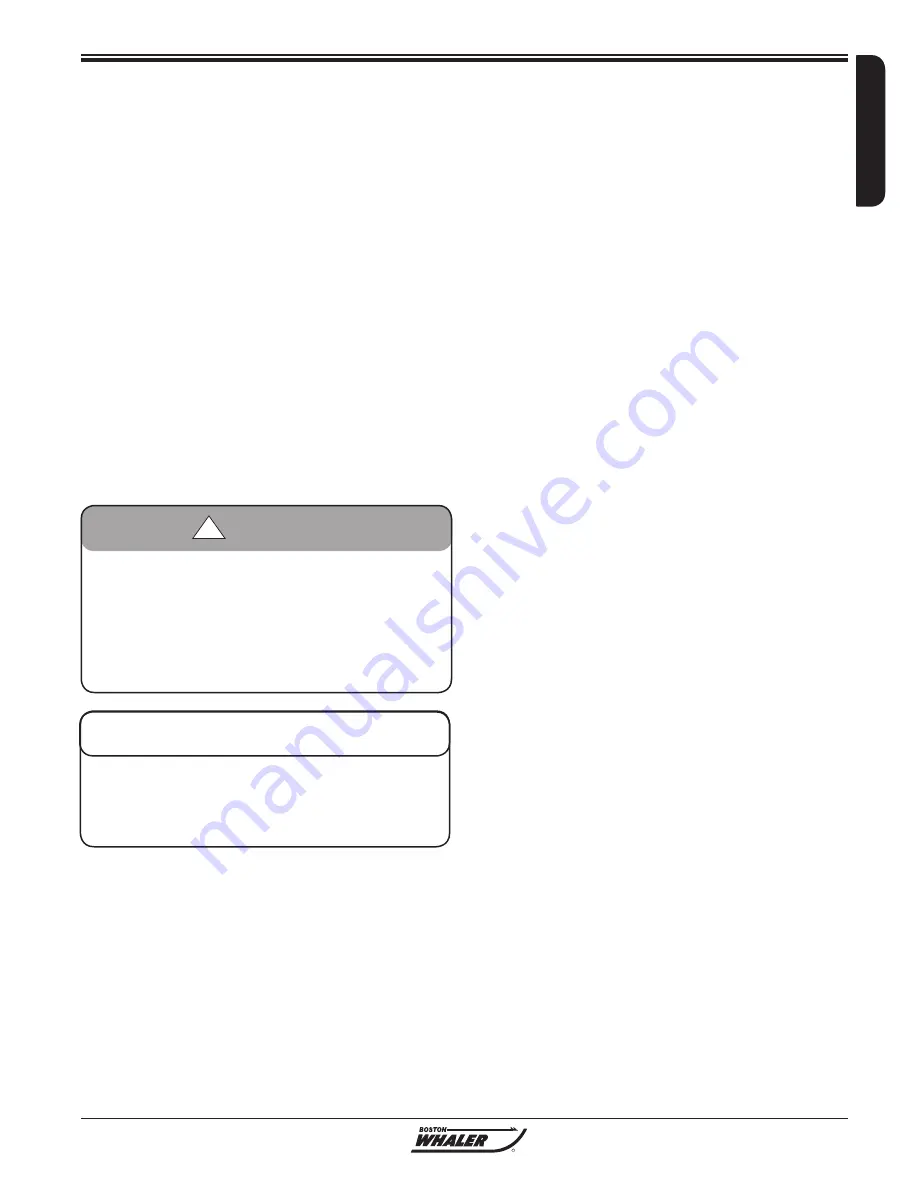
1-5
370 Outrage
Section 1• Safety
R
Section 1 • Safety
Whistle, Horn
You must have on board, some means of making
a loud sound signal. Navigation rules require that
a sound made by any audible device be capable of
a four (4) second blast, and be audible for 1/2 mi.
(.80 Km).
Visual distress Signals
If you operate your boat in coastal waters or on the
Great Lakes, you must have a visual distress signals
for day and night use on board. At least three (3)
U.S.C.G. approved pyrotechnic devices marked
with date showing service life must be carried, be
readily accessible, in serviceable condition and not
be expired.
Store all pyrotechnic signals in a well marked,
waterproof container.
Additional Recommended equipment for
safe operation
In addition to the legally mandated equipment, the
following items are neccessary for safe boating,
especially if your boat is out of sight of land.
Personal Flotation Devices (PFD’s)
• First Aid kit
• Compass
• Charts/Maps
• Manual bilge pump
• Visual distress signals
• GPS or LORAN
(for day or night use)
• Spare keys
• Marine VHF radio
• EPIRB-Emergency
• Moisture repellent
positioning-indicat-
• Mooring Lines
ing radio beacon
• Fenders
• Boat hook
• Waterproof fl ashlights
• Extra batteries
• High power spotlight
• Instruction manuals
• Spare propeller
• Lubricating oil
• Tool kit:
• Anchor
- Screwdrivers, (phillips & fl at)
- Pliers, (regular, vise-grip, tongue & groove)
- Wrenches, (box, open end, allen & adjustable)
- Socket set, (metric or U.S.)
- Electrical tape & duct tape
- Hammer
- Spare parts kit, (spark plugs, fuses, etc.)
Depending on the state or country of operation,
the operator of a vessel may be fi ned for failure
to comply with local or national rules regarding
PFD usage.
NOTICE
Legally Mandated Equipment
(Minimum Required)
Consult your National Boating Law Enforcement
Agency. The following equipment is the minimum
required by the U.S. Coast Guard for a boat which
is more than 26 ft. (7.9M) in length but less than
40 ft. (12.2M) in length.
One (1) Coast Guard approved Type I, II, III is
mandatory for each person aboard.
One (1)throwable Type IV device is also required
to be onboard.
A Type V device is acceptable (See page 1.8) if worn
for approved use.
ALWAYS WEAR A PFD WHEN BOATING.
‘
Fire Extinquishers (Portable)
If there is no fi xed fi re extinguishing system installed
in the engine or generator spaces, the Coast Guard
requires two (2) Type B-I or one (1) B-II fire
extinguisher(s) be on board.
The American Boat & Yacht Council (ABYC)
recommends that you carry three (3) A,B or C Type
fi re extinguishers on board and located within easy
reach of the helm, Engine(s), and galley or passenger
cockpit.
There is rarely time to reach stowed life jackets
in time of emergency. Boaters should always
wear a properly fi tting, approved life jacket
when on the water.
Children and non-swimmers MUST wear PFD’s
at all times when aboard.
!
WARNING
Summary of Contents for 370 Outrage
Page 2: ......
Page 20: ...xx 370 Outrage R THIS PAGE INTENTIONALLY LEFT BLANK...
Page 162: ...4 16 370 Outrage Section 4 Electrical System R Battery Diagram Sheet 1 Fig 4 16 1...
Page 164: ...4 18 370 Outrage Section 4 Electrical System R Helm Breaker Panel Sheet 3 Fig 4 18 1...
Page 168: ...4 22 370 Outrage Section 4 Electrical System R Windlass Schematic Sheet 7 Fig 4 22 1...
Page 170: ...4 24 370 Outrage Section 4 Electrical System R DC Distribution Panel Sheet 9 Fig 4 24 1...
Page 172: ...4 26 370 Outrage Section 4 Electrical System R Hardtop Scematic Sheet 11 Fig 4 26 1...
Page 180: ...4 34 370 Outrage Section 4 Electrical System R Bilge Wiring Schematic Sheet 19 Fig 4 34 1...
















































